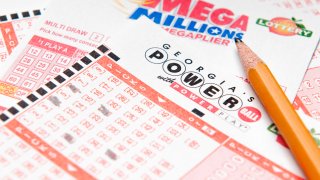
- This year's winners of Powerball and Mega Millions jackpots have collectively paid roughly $515 million to the IRS so far via 24% withholding on their windfalls.
- The top tax rate of 37% means winners can expect to owe more.
- The chance of winning Powerball is about 1 in 292 million; for Mega Millions, it's 1 in 302 million.
When it comes to the lottery, it's been a good year so far for Uncle Sam.
Winners of Powerball and Mega Millions jackpots — worth an advertised $2.9 billion in all — have collectively paid roughly $515 million to the IRS in 2021 taxes. And that won't be the end of it.
Whether jackpot winners go with the immediate, reduced cash option (most do) or an annuity stretched across three decades, 24% is withheld for federal taxes. Yet because the top rate of 37% is applied to income above $523,600 (single tax filers) and $628,300 (married couples filing jointly), more ends up being owed.
Get top local stories in DFW delivered to you every morning. Sign up for NBC DFW's News Headlines newsletter.

So far in 2021, there have been five Powerball jackpot winners — and the pace of those wins could pick up, because a third weekly drawing will be added on Mondays starting Aug. 23.
Mega Millions, meanwhile, has had four winners this year (its $55 million jackpot won on June 8 remains unclaimed, however). For all collected prizes, winners have chosen the cash option instead of the annuity.
Money Report
For the three claimed Mega Millions jackpots — which have ranged from $96 million to $1 billion — winners' cash options were worth a combined $1.2 billion. The 24% federal tax withholding has totaled $288 million, reducing the collective take to $912 million.
More from Personal Finance:
Here’s where return-to-office plans stand now
Where to put emergency cash amid rising inflation
Some summer activities can impact your taxes
Powerball winners' cash options have totaled $945.7 million, with jackpot amounts ranging from $23.2 million to $731.1 million. After the 24% federal withholding of $227 million, winners were left with $718.7 million.
For illustration purposes: If winners were unable to reduce their taxable income at all, another 13% — the difference between the 24% withheld and the top tax rate of 37% — would be due to Uncle Sam. Collectively, that would be another $278.9 million or so going to federal coffers ($793.9 million altogether).
Of course, those lottery wins generally contribute just a drip in the federal tax bucket. Income taxes paid by individuals are expected to comprise about $1.9 trillion (50%) of the government's estimated $3.8 trillion in revenue for fiscal year 2021.
Local coffers also benefit from big lottery wins, as well. Depending on where the ticket was purchased, state taxes ranging from zero to more than 8% also would be applied.
Like the federal withholding rate on jackpot wins, the amount withheld for state taxes might also be less than what you'll owe.
There are ways to reduce how much of your winnings get taxed, although not many. For 2021, due to a temporary change in federal rules, the charitably inclined can lower their taxable income by making a qualified cash donation worth up to 100% of their adjusted gross income (that limit is scheduled to revert back to 60% in 2022).
Some lottery winners set up their own charitable foundation or similar option, such as a donor-advised fund, and donate a portion of their windfall to it.
The Mega Millions jackpot is $179 million ($129.5 million cash option) for Tuesday night's drawing. Powerball's jackpot is $211 million (cash option of $153.9 million), with the next drawing set for Wednesday night.
Your chance of winning Powerball is about 1 in 292 million. For Mega Millions, it's 1 in 302 million.






